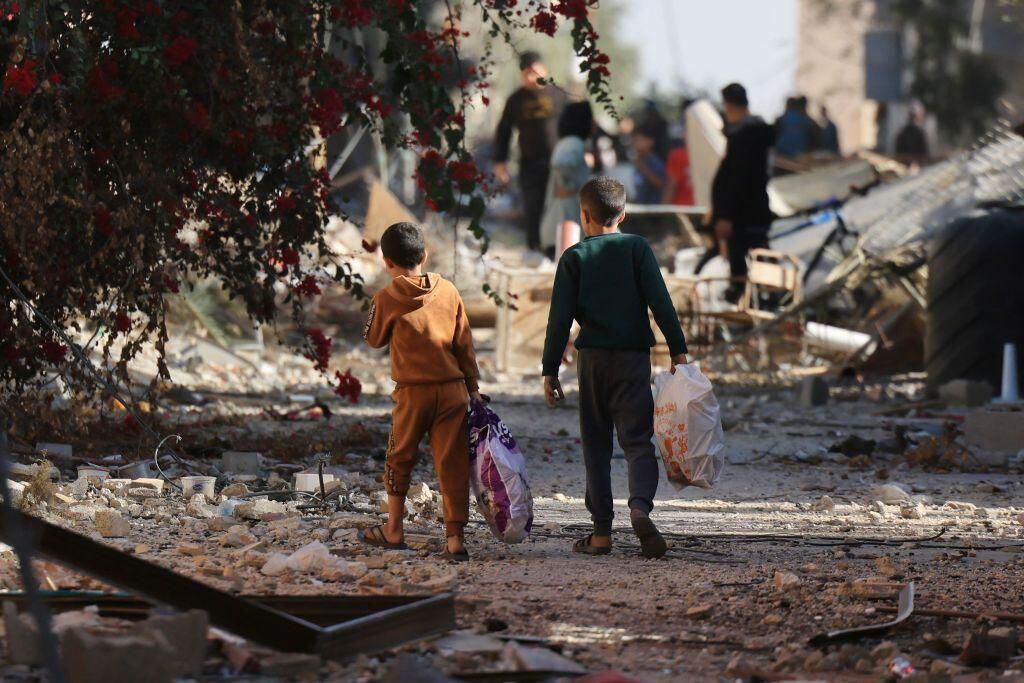A Unicef representative at Gaza strip He said he had never seen so many children so seriously injured by conflict.
“I don’t believe that in my 20 years at Unicef I have seen so many children with war injuries,” James Elder, spokesperson for the organization who arrived in the Gaza Strip a few days ago, told the BBC this Monday. .
LOOK: What are the differences between Sunnis and Shiites that are behind the conflicts in the Middle East
Elder on Sunday visited the northern part of the territory, the hardest hit by Israel’s attacks in response to the murder and kidnapping of Israelis by Hamas on October 7.
“When a mortar hits your building, your house, it’s multiple injuries for a child. They’re broken bones, but they’re also [heridas por] splinters are horrible burns for children,” he added.
Elder described hospitals in the northern Gaza Strip as “war zones,” where parking lots and outdoor spaces are filled with makeshift emergency rooms.
“Children in hospitals need many more medical supplies than we receive. (…) Doctors need these things urgently. I am watching doctors in emergency rooms making decisions as they make a calculation between who can survive and who doesn’t survive, and that includes children,” Elder said.
Israel and Hamas began a four-day truce on Friday and extended it for another two days this Monday.
The period included the exchange of more than 50 hostages held by Hamas for the release of 150 Palestinians held in Israeli prisons, most detained for violent attacks against Israeli security forces.
Both groups mainly include women and minors.
“I was in a church in the north yesterday, in a hospital that was also hit [por proyectiles]. It’s an emergency room. I spoke to a 7-year-old boy who lost his mother, his father and his twin brother. And I asked his aunt: ‘Why does he constantly close his eyes while he talks?’ And she said, ‘He’s so afraid of forgetting what his mother and father were like, that he wants to close his eyes and keep imagining them, not lose them in his mind as much as he lost them in real life.’ “Said the Elder.
“Unfortunately, these stories stretch from north to south across the entire Gaza Strip,” he said.
Between the start of the conflict and November 22, it is estimated that more than 5,300 children died in the Gaza Strip as a result of the war, according to figures released by Unicef.
The children’s advocacy organization also said it had reports of around 1,200 children still under the rubble.
“The destruction of Gaza and the murder of children will not bring peace to the region”said the Elder.
On the Israeli side, the government reported around 1,200 deaths at the hands of the Islamist group Hamas.
“Today, the Gaza Strip is the most dangerous place in the world to be a child,” declared UNICEF Executive Director Catherine Russell before the UN Security Council on Wednesday the 22nd.
Elder questioned whether the “natural impulse” to protect children is being lost in the world and urged Israel to safeguard the youngest.
“Bring the hostages home, but make sure we don’t see continued devastation for the children in Gaza,” he said.
“Are you here to stop the war?”
The Unicef representative described the panorama he saw in the Gaza Strip as “really difficult”.
“It’s just trauma and stress. Anxiety is written on people’s faces,” he said.
“People are desperate, they have lost everything. They lost their homes. Almost everyone I talk to has lost a loved one.” he added.
Elder described the truce agreed between the parties as “a truce in which people look for their loved ones, their lost children” and that he wants the pause to become a ceasefire.
The official said that during his visit to this area of Palestinian territory, people approached him speaking in English and asked him: “Are you here to stop the war?”
“Of course my answer is, ‘No. Your life is decided by people from other places. We’re here to deliver help and I guess to stop the bleeding.'”

According to Elder, the three things Gazans ask of them are: food, water and fuelthe latter because it is used in desalination plants to provide drinking water to the population.
“This is a game changer. I now see a lot of kids with serious gastrointestinal illnesses, so clean water is a game changer and fuel equals clean water,” he said.
The head of Unicef indicated that he saw both “grandparents carrying their grandchildren” and “children pushing elderly and sick people in wheelchairs” fleeing from north to south of the Gaza Strip.
Although he said it was difficult for them to make the decision to drop everything and leave.
“People just don’t want to leave the house and I understand why. Who wants to leave their home and everything they’ve worked so hard for, especially when you’re going to come down south and be at what was a high school or technical college, and now there’s 40,000 people where your 15- my daughter is going to stand in line for five hours. go to the bathroom,” he said.
Source: Elcomercio
I am Jack Morton and I work in 24 News Recorder. I mostly cover world news and I have also authored 24 news recorder. I find this work highly interesting and it allows me to keep up with current events happening around the world.

:quality(75)/cloudfront-us-east-1.images.arcpublishing.com/elcomercio/VGUDZ4JVUJEZPC35LJCLZ2TDRQ.jpg)


:quality(75)/cloudfront-us-east-1.images.arcpublishing.com/elcomercio/5XVZ7WGE4FB7TDRH3DESBISBRA.jpg)


